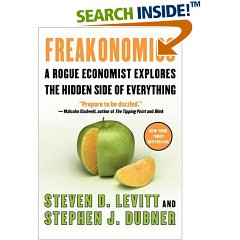Freakonomics

Just finished reading this amazing book by Steven Levitt and Stephen Dubner, and have to admit that it was quite enlightening. Never had I thought about diverse associations like they have made in the book like abortion and crime rates, a person’s name and their social standing, the actual recidivism of the Ku Kluk Klan when compared to the environment of fear and hatred that they perpetrated, the statistics on perfect parenting, workings of a crack cocaine gang and much much more.
Half expecting charts and tables since this was a book about economic co-relations, I was pleasantly surprised that this book was a fast and interesting read. There are witty anecdotes in this book, hardly something that you expect from something as dry a subject like Economics. Serious economists like Michael Higgins or my buddy Atul may be dismissive of this book as ‘Economics Light’ or as ‘Economics for Dummies’ since it really just skims the surface of economic modeling, co-relations and the heavy duty stuff. But what it does is whet your appetite and forces you to think along lines of these quirky associations. Works for a layperson like myself.
There is a section in the book called ‘Why do drug dealers still live with their mom’s? which delves into the inner workings of a crack drug gang in
Another section deals with names and a detailed breakdown of top 20 white male/female names and top 20 black male/female names and how society perceives the social background of a person, depending upon the name. Talking about names, growing up, with an uncommon moniker, has given yours truly many a sleepless nights because of incessant cruel bantering by classmates and kids at school, as hyper energetic kids are wont to torture. Spelt ‘Sourin’ but pronounced ‘Showerin’, there had been many a connotations of my name on the school playground with ‘So urine’ being one of the more popular ones. My only retort to this cruel taunt would be ‘Yes feces’ since narrating the “s” word meant spending time outside the principal’s office or raps with a cane on your bony buttocks. Bloody shit.
All in all reading this book was time well spent and I look forward to more simulating stuff from Levitt/Dubner. Next onto to Thomas Friedmans ‘The World is Flat’, which for some weird unknown reason is in heavy demand at the Rochester Hills library, since I’ve had it placed it on hold for about 5 weeks now. Well, all in good time. The sheer size of Shantaram has been a deterrent, despite raves by the wise ones and sundry.
I’m curious to know if any of you gentle readers have read ‘Freakonomics’ and your views about this intriguing book. Do let me know.

3 Comments:
The book is interesting and I suspect that the author had a very encouraging set of advisors that let him explore what he wanted to...there is a referene to that in the beginning of the book. When you are strait jacketed in your research and get a lot of encouragement, it is amazing what kind of work you can do. Does this make sense to you?
I have read Friedman's book and you can check out my podcast review of the book.
Kamla
This is a good one to read. I was very hesitant to buy this book for a while, despite several reviews in the Television and newspapers. Then I thought there must be something very good about this book and that's why it was a topseller for a long time. When I started reading, I felt like engaging in a casual dialogue for days and finished it in almost 3 days.
I got the book 'The World is Flat' as a gift. It kind-a recaptures lot of critical things in the century. I am currently reading a book 'Getting into your customer's head' by Kevin Davis. Not a big bestseller, but gives different approaches to closing the business and working with customers.
I would also recommend 'Search' by John Battelle. It takes you back in decades on how search engines evolved and how Google capitalized the theory.
CU
Karthik
Hi Sourin
I read Freakonomics but I have mixed feelings. I really don't like the fact that the economitricians are taking over economics and I feel that much econometrics is not quite science. I wouldn't be surprised if later studies tend to discount the abortion crime rate hypothesis - it is very hard to prove anything with econometrics. But an interesting book, nontheless.
Post a Comment
<< Home